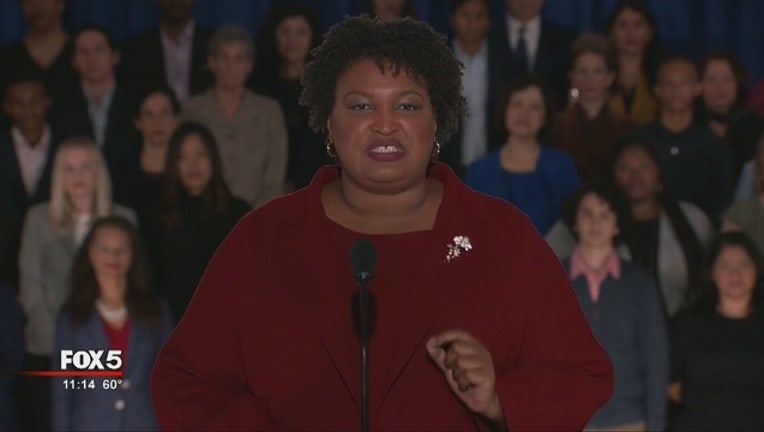Georgia's Stacey Abrams looks for a winning strategy in loss

ATLANTA (AP) - Stacey Abrams is a woman in demand.
Months removed from her surprisingly narrow defeat in the Georgia governor's race, Abrams is being heavily recruited to run for Senate, weighing another campaign for governor and even hearing overtures from prominent activists who want her to run for president.
It's a remarkable turn for a woman who, two years ago, was leading the vastly outnumbered House Democratic caucus at the Georgia Capitol. She now bounces from political gatherings in Las Vegas and Washington to debating societies in Oxford, England, not to mention an Atlanta union hall where she delivered this year's Democratic response to President Donald Trump's State of the Union.
"People are hungry for the kind of leadership Stacey has been exhibiting throughout her campaign and after," Leah Daughtry, a prominent Democrat who co-hosted a recent political conference for black women where Abrams got a rousing welcome. "Whatever she decided to do, she would have an army of people ready to step in and help."
Yet for someone with so many options, there's no obvious next step for Abrams.
She has entertained conversations in recent months with donors and other Democrats about running for president, according to aides. She has also been invited to Iowa next month to deliver a keynote address to the Polk County Democratic Party, an event that would put her in front of key activists in the nation's leadoff caucus state.
Those encouraging Abrams to run for the White House argue that her stock may never be as high as it is right now and that, in a field that already spans a dozen candidates, the nomination could go to anyone.
"It could literally be anybody's game," said Symone Sanders, a veteran of Bernie Sanders' 2016 presidential campaign and one of Democrats' most visible black female strategists.
But there are downsides. It's not clear that Abrams could sustain the kind of national fundraising base she managed in 2018 when she was trying to make history by becoming America's first black female governor and flipping an emerging Deep South battleground state. The field already includes successful fundraisers such as Vermont Sen. Bernie Sanders and two black candidates: Sens. Kamala Harris of California and Cory Booker of New Jersey.
That's led some Abrams insiders to say she's not looking at the presidential race as seriously as she is choosing between the Senate and another run for governor.
Those close to Abrams say one of her key considerations is how she can make the biggest impact on the issues she cares about most. She ran for governor promising to expand Medicaid insurance, prioritize spending on public education and continue to overhaul Georgia's criminal justice system.
She's added a full-throated discourse on voting rights since her gubernatorial campaign was marred by allegations that the victor, Republican Brian Kemp, used his previous post as secretary of state to make it harder for poor and middle-class Georgians to vote. Kemp vehemently denies wrongdoing.
Senate Majority Leader Chuck Schumer is trying to coax Abrams into challenging Republican Sen. David Perdue in 2020 and has made voting rights a central pillar of his pitch.
"There's no one who knows how to fight for voting rights better than Stacey Abrams," Schumer, D-N.Y., said in an interview. "If she got to the Senate, she'd have a huge platform to do it, not just in Georgia, but nationally."
But some Georgians close to Abrams say she knows the limits of being a lone senator - and potentially one in the minority. They also note that she's well-aware of the risks that come with losing twice, particularly in back-to-back election cycles.
Her advocacy work since the election has focused most directly on Georgia, potentially positioning her for a 2022 rematch against Kemp. She morphed her campaign operation into a political action group, Fair Fight, focused on election law and ballot access. She's testified in front of a congressional hearing on voting matters and is pushing for a paper ballot system in Georgia.
Lauren Groh-Wargo, Abrams' longtime adviser and friend who ran her 2018 gubernatorial bid, said Abrams won't "foreclose any option until she has to."
But Groh-Wargo argued that an ability to advocate for voting rights will be crucial in Abrams' decision process.
"The way that election played out has been a singular experience for her, so she's still trying to process it all as she decides what's best," Groh-Wargo said, adding that she expects Abrams to declare her intentions on the Senate in early April. Any other decisions wouldn't necessarily come at the time, she said.
In the meantime, her star power isn't likely to dim.
She was in Great Britain this week speaking to The Oxford Union, a debating society that draws its members from the Oxford University Community. She heard "Run, Stacey, run!" chants last week at the Black Enterprise Women of Power Summit in Las Vegas.
She was a featured speaker at the Democratic National Committee's winter meeting last month in Washington, where she focused as much on her successes - winning 85,000 more votes in Georgia in a nonpresidential election year than Hillary Clinton won in 2016 - as on the result. And, of course, she gave a nod to what her fellow partisans are wondering about.
"I'm going to run for something," Abrams said, pausing with a grin. "I'm considering president of my homeowners association."
___
Whack reported from Philadelphia. Associated Press writers Julie Pace in Washington and Thomas Beaumont in Des Moines, Iowa, contributed to this report.
___
Follow Barrow and Whack on Twitter at https://twitter.com/BillBarrowAP and https://twitter.com/emarvelous

